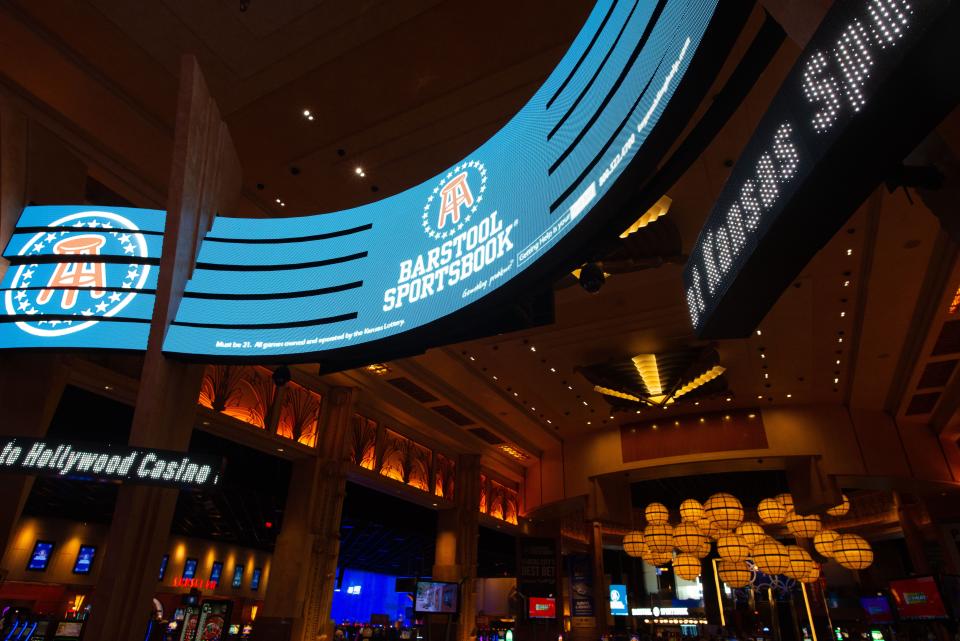With Kansas a year into sports betting, what impact has there been on gambling addiction?
- Oops!Something went wrong.Please try again later.
For years, many Kansans clamored for the legalization of sports betting, intent on placing a bet on Patrick Mahomes and the Kansas City Chiefs to win it all.
But fears persisted all along that others might become addicted to wagering — and worries have persisted that the state's infrastructure to publicize and treat problem gambling won't be able to keep up.
Early data is inconclusive on how sports betting has impacted problem gambling, although there has been a rise the number of calls to the state's helpline to connect those addicted to gambling with treatment.
But spending on treatment and awareness for problem gambling has largely remained the same, despite more money coming into the fund earmarked for just that purpose. As a result, Gov. Laura Kelly's administration has proposed a move that could more than double the amount of funds spent to address the problem.
Per the terms of the 2022 law, each of the four state-licensed casinos were allowed to sign deals with up to three sportsbook companies to do just that. Hollywood Casino, for example, inked a deal with Barstool, while Boot Hill partners with DraftKings.

Legalizing the practice was never expected to bring a torrent of new revenue to the state's coffers. In the first nine months that sports betting has been live, the state has pulled in a little over $6.5 million in tax revenue — more than what the Kansas Lottery initially projected would be raised in the first year.
Experts caution that it is still too soon to assess whether sports betting is inherently more addictive than blackjack or slots. But, in Kansas, worry about the long-term impacts remain given the near-ubiquity of advertisements and mobile betting apps.
"It is just like playing 'Candy Crush,'" Deborah Snapp, who leads the Southwest Kansas Problem Gambling Taskforce, said. "Once you start, it's hard to walk away."
Kansas sees rise in helpline calls after sports betting is legalized
James Whelan, a research professor of clinical health at the University of Memphis and director of the Institute for Gambling Education and Research, noted there are key differences between a gambling disorder and addiction to alcohol or drugs.
Typically, 1-2% of the population would meet the criteria of a gambling disorder, while another 3-5% show problematic signs that fall short of a clinical diagnosis.
In Kansas, a 2017 study found that a little over 6% of those who responded to the survey displayed behaviors classifying them at a high risk of problem gambling.
Effective treatment exists but individuals are more likely to drop out. That could simply because they cannot afford treatment but also because often individuals are convinced an opportunity exists to win back money that they previously lost — something unique to problem gambling.
"They have this hope that they're one win away from fixing all their problems," Whelan said. "And I think that's easy to identify with. When the Powerball or Mega Millions or whatever jackpots gets high, who doesn't wonder about what my life might be like if I actually won all that money?"
Between February and June, 303 people have called the state's problem gambling helpline, seeking addiction support for themselves or someone else. That is an 80% increase over that same time period last year.
But this doesn't tell the full story. In Kansas, the type of calls to the helpline are divided up into two categories. One is called an "opportunistic call," where an individual inadvertently calls the number, is not yet actively looking for assistance or hangs up before the call is answered.
The second type of call is one where a person is purposefully seeking help or information. Both types of calls have increased noticeably since sports betting was legalized.
In 2023, at least 34 of the calls to the helpline are from individuals calling about sports betting specifically, according to figures provided to Stephanie Roberts, a licensed social worker and certified gambling addiction counselor in Wichita.
But Roberts noted the helpline numbers are not a good measure of gambling addiction in Kansas, as there is no statewide advertising campaign for its services, meaning there are far more people in need who don't know where to turn for help.
"As long as the state thinks these helpline calls are determining how big a problem we have, they're very wrong," she said. "Because research shows the opposite. If you're not marketing things well, people don't know about it, don't act on it, or don't remember it's out there and they don't take advantage of it."
Is sports betting more addicting than other forms of gambling?
There has been a similar rise in the number of individuals who have voluntarily excluded themselves from gambling at the state's casinos or sports betting apps, a program that has existed for years as a way to help individuals set boundaries on addictive behaviors.
In the first five months of 2022, 77 individuals were added to the self-exclusion list. Over that same time period in 2023, that number was 162, though some of those people were expanding their existing restrictions for casino gambling to sports betting.
These numbers also do not necessarily tell the story of a rise in addiction from sports betting, experts say.
It can take years for an individual to realize that they have a gambling problem and it can take even longer before they seek treatment. Research shows that problem gambling can carry significant stigma, even compared with other addictions, as individuals can be portrayed as merely lacking willpower or having a moral deficiency.
The upshot is that it could take some time for a fuller picture of sports betting's impact on Kansans to emerge.
Indeed, researchers have largely not examined whether the readymade access to sports betting makes an individual more likely to get addicted.
Whelan said the introduction of new forms of gambling often lead to a brief spike in individuals exhibiting signs of gambling problems, before returning to the previous baseline in the medium term.
He pointed to the expansion of slot machines, which led to fears that the ease of playing the one-armed bandits might get gamblers hooked more readily.
"From an evidence point of view, we just don't know," Whelan said. "This is a brand-new phenomenon. People are kind of studying it. There's not a lot of money out there to really figure out how concerned we should be.
"Personally, as someone who reads the literature, I'm not convinced that sports gambling is going to be the end of the world."
'There's just no way we can compete with that'
What was expected to increase alongside sports betting's legalization, however, was money.
When casino gambling was legalized in Kansas in 2007, Kansas was hailed for setting aside a then-unprecedented amount of money to treat gambling addiction.
Those funds are used for a variety of purposes. All people who call the helpline are connected with state-funded treatment and state government also uses the monies to train and certify gambling addiction counselors.
But, historically, only a slice of those funds has been used for problem gambling. Instead, the bulk of the roughly $8 million earmarked for the fund from casino and sports betting revenues continues to be used for more general substance abuse and mental health treatment.
Rep. Will Carpenter, R-El Dorado, who chairs the committee that deals with gambling policy, said if there were a demonstrated need to use more of that money for problem gambling, it would be made available rather than siphoned off for other purposes.
That need, he said, has not yet emerged.
"If we start to exhaust the $8 million, if we need to take that money out or stop using for other purposes, fine," he said.
Kansas Department of Aging and Disability Services, which administers problem gambling services, expects to spend about as much on treating problem gambling in 2023 as it did before sports betting was legalized. Turnover in the agency means spending on administrative posts designed to promote problem gambling awareness and connect with local stakeholders has actually dropped.
Still, the money distributed to the local problem gambling groups has flatlined at around $68,000 a year.
"When you've got multiple sports venues advertising their product, and you've got our tiny little budget, there's just no way we can compete with that," Roberts said.
When the sports betting bill was being considered, KDADS estimated that more than $1.3 million would be needed to treat addiction, roll out a statewide media campaign and conduct a study to see how widespread problem gambling is in Kansas.
Funding boost to target better marketing and increase staffing

To date, however, none of that spending has occurred — but that might soon change.
The Kelly administration is proposing using $1.2 million in the fund, currently used for unrelated grant programs, to tackle problem gambling.
Cara Sloan-Ramos, a spokesperson for KDADS, said $1 million in funding would be used to ramp up the state's marketing of problem gambling and also include some sports betting specific messaging.
KDADS, moreover, is aiming to hire new specialists specifically designed to handle gambling addiction, a move that would allow each region of the state to have a dedicated staffer.
And Sloan-Ramos said the plan was also to commission a prevalence study designed to survey how often Kansans are gambling and how many are showing potentially problematic signs. That type of survey is typically conducted once every five years but the most recent version dates back to 2017.
"Now that Kansas has had sports betting for one year, we feel it’s the perfect time to conduct a prevalence study," Sloan-Ramos said in an email.
But Snapp, the Southwest Kansas Problem Gambling Taskforce, noted it isn't just adding more money but spending the existing funds in a more effective way.
Her team will spend the bulk of its budget on advertising around the region, but it typically is focused on radio spots, billboards or signage at a high school football game.
That once might have been effective but in a world where the bulk of people at a football game "have got their faces in their phones," the need to innovate becomes paramount.
New Jersey, for instance, established an office to monitor the effectiveness of its problem gambling outreach and made it easier for individuals to opt-out of industry ads. Massachusetts has a virtual program allowing slot machine users to better set a budget.
"We're not doing anything different," Snapp said. "We're still using the same images for our awareness campaign. We're not using any of the new creative tools that other states are using. We're just putting up ads and hoping people call the helpline number, which was the best that we could do then.
"There's way more resources, way more tools available to us now that weren't available then."
This article originally appeared on Topeka Capital-Journal: Kansas sports betting has uncertain effect on gambling addiction

